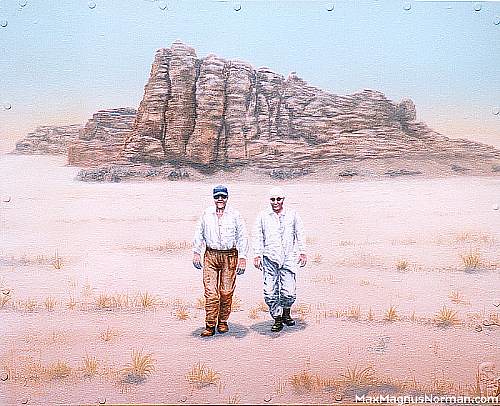Heat-Wave

"Desert walks can be invigorating."
“The prairies were once so lonesome and dreary and treeless that men called them the
We get the point. Oh, let’s face it, everyone likes a little blood. It is as though innocence requires that someone brave enough, dumb enough, crazy enough throw that stone crashing through the golden temple’s stained-glass window. If William Logan were a pitcher we’d say he had a hell of an arm. His recent attack on part of the established American poetry scene—and you can tell me whether that’s SoQ enough or not or something graver, deeper and wider—lights up like a Christmas tree in August; he is that exaggerated. The question is whether he needs to be in our age of poetry idol makers.
Logan has been compared to Jarrell as the hard critic of our days. The comparison isn’t fair though if Logan started his own poetry review magazine it would no doubt be called “Little Jarrell”. (He even hits on poor old Walter de la Mare, the one that wrote poems on a typewriter, like a typewriter.) I’m not so sure whether the poetry world needs viper-tongue criticism, but it is almost morbidly refreshing to see some negative asides on writers otherwise untouchably immortal. Imagine this plug in Ashbery’s latest book cover: “The quality of whimsy is not strained. It falleth from Ashbery like the gentle rain—and it falleth on a lot of young poets now, students in the School of Goofball Poetics, boys who cut their teeth on Ashbery and Charles Simic and James Tate and now show little interest in any poems written before Dada came to town.” Wow! That hurts. Bringing down idols may be a by-product of jealousy, such statement being jealous enough, (though Logan cannot out-versify any of the poets he blasts here), but it’s almost criminally fun to see John Ashbery slapping his pants after falling in the dust. The fall is, of course, not a fall in desert sand, but a slip on icy pavement from which he might smile slightly embarrassed.
So ok, Ashberry is human, as is Dean Young (“full to the gills with geegaws and thingmabobs and dojiggers”), Jorie Graham (“loves big ideas the way small boys like big trucks”), Ted Kooser (“a prairie sentimentalist who writes poems in an American vernacular so corn-fed you could raise hogs on it”), and even Richard Wilbur (“it’s curious that John Ashbery, who is only a few years younger, still seems our contemporary, while Wilbur sounds like an old fussbudget sorry he threw out his last pair of spats”). C’mon, it’s that little devil in us that says “stutter, Placido Domingo” on that big night at the Met. That’s right, even gods have those awful mortal days.
Viper-tongue criticism is a part of us. We think it, but rarely state it. Our ego has been trained too well. We now stroke it to make it grow. “Don’t burn them bridges now, boy.” So, yes, to me, here, alone a small dose of

3 Comments:
Some of us had William as our teacher. Imagine turning in your poems to him weekly, and now imagine the comments and the blue ink that came back! Surprising I still write poems at all. ;)
By C. Dale, at Fri Jul 15, 01:26:00 am
C. Dale, at Fri Jul 15, 01:26:00 am
Hi, C. Dale. I remember you saying that Logan was a friend of yours, to which I might add: “With friends like that….” Only joking. If I had to pick an animal representation of Logan, I’d have to think deep. Something like that fish—the ugliest one with the huge mouth and teeth and that little light hanging from a fishing rod appendage from the forehead. Yes. Logan lures you in and then—thump—he’s got you. But mostly I think we miss Logan’s point, as I have done in my blog entry. We concentrate on his “attacks”, as many did with Jarrell, without seeing the greater truths hidden in the criticism. I think Logan is intelligently instinctive in this regard, though not quite as brilliant as Jarrell in presenting it in my view, particularly when he grasps to point out the serious trouble American poetry is in, despite the divisions in schools and movements. That is something troubling to me about poetry in general; that sameness / staleness that Logan alludes to. Despite the high levels of production and the amounts of “good” poetry out there it has still been our turn to live in a transitional age for poetry. And it is desert-like in many ways, despite the occasional oasis.
By Chaty, at Fri Jul 15, 09:34:00 am
Chaty, at Fri Jul 15, 09:34:00 am
mere ko bahot acha lagta hi .. parmeshwar ka shandar beta hu
Apna Showroom 24k Swiss Gold Plated Shri Sampurna Rog Nashak Yantra for Home, Office, Business, and Puja Ghar - Spiritual Energy and Prosperity Enhancement (Shree Sampurna Rognasak, Medium, 13x13cm)
Apna Showroom 24k Gold Plated Shree Sampurna Vastu Yantra for Home, Office, Business, and Puja Ghar - Spiritual Energy and Prosperity Enhancement
Apna Showroom Dressing Hair Comb for Men, Kids, Girls, Ladies And Women
He is the King and I am His son and i really like to ssy
By Do One Thing, at Sun Nov 30, 11:21:00 am
Do One Thing, at Sun Nov 30, 11:21:00 am
Post a Comment
<< Home